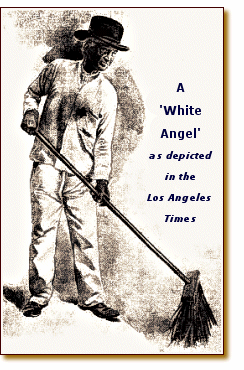Metropolitan News-Enterprise
Thursday, September 6,
2007
Page 11
REMINISCING
(Column)
M & M, L.A. Times Save Jobs of ‘White Angels’
By ROGER M. GRACE
The city didn’t want to
do it. The Merchants’ and Manufacturers’ Assn. wanted it done. It was
done…hand-cleaning of streets was instituted in the downtown/business area of
Los Angeles on Nov. 1, 1898. A cadre of 15 men with brooms, shovels and rakes
began taking care of the litter, the dirt and the muck during the day,
surpassing the efficiency of the machines used throughout the city at night.
The squad, commanded by Superintendent of
Streets John H. Drain, became known as the “White Angels.”
That designation was copied from the
appellation lent 2,700 sanitation workers in New York City, clad in white
uniforms, and known as “Waring White Angels.” They were the troops of Civil War
Col. George Waring, appointed in 1895 to head the Big Apple’s Department of Street
Cleaning.
Application of the term “White Angels to
downtown L.A.’s street sweepers appears in a Los Angeles Times column of July
7, 1899, where it might well have originated. The column says:
“Drain’s ‘White Angels’ are in welcome
evidence on the streets in more ways than one. Their dress is picturesque, but
their art in cleaning the foul-smelling gutters is what commends them to
residents and visitors. Their presence and helpful labors give another, though
practical force to the city’s distinguishing title: ‘The City of the Angels.’”
The Times was a steadfast backer of the M & M, and was staunchly
committed to the hand-sweeping effort. Despite the clout of the organization
and the newspaper, the program had been suspended during May and June of 1899,
being resuscitated July 1, just in time for a convention here of the National
Educational Assn. The sum of $5,321 was allotted…enough to keep the sweeping
going until Nov. 1.
For a while, it looked as if the
“White Angels”—by then numbering 18—would be laid off when the funding ran out.
 The Times supported the M & M’s callfor continued funding. In responding to the argument raised that the angels
couldn’t be of use in the rainy season coming up, the newspaper did not point
out the rarity of rain in Los Angeles or that the hand-sweepers had not been
idle during the previous fall and winter. Instead, it’s “All Along the Line”
column of Oct. 16, 1899, says:
The Times supported the M & M’s callfor continued funding. In responding to the argument raised that the angels
couldn’t be of use in the rainy season coming up, the newspaper did not point
out the rarity of rain in Los Angeles or that the hand-sweepers had not been
idle during the previous fall and winter. Instead, it’s “All Along the Line”
column of Oct. 16, 1899, says:
“There are those who say, ‘We cannot use
the white angels when the rainy season is on,’ advancing as a reason that these
men cannot sweep wet streets. There are also those—and their number is
legion—who say, ‘What is the matter with having these men converted into men
with hoes, and distributed at congested street crossings to keep mud at a
minimum?’ One man could police a whole street, thus covering all the district
in which plank crossings are laid and save shoe leather, profanity and the
general moral tone of the community. No normally constructed woman can board or
leave a car on a rainy day in this city without developing mental ginger enough
to make it hot for the man of the house when he returns for rest and peace.
Only angels can fit this problem, and Drain’s brand has the call.”
On Oct. 30, 1899, the City Council
extended the program…but only for one month. Some of the city fathers alluded
to the prospect of paying for the program through institution of a vehicle tax.
The Finance Committee of the council and
a special committee of the M & M conferred on Nov. 3, and it was agreed
that the committee would recommend imposition of a tax on everything on wheels,
including bicycles.
The M & M not only favored
continuation of the hand-sweeping, but saw the imposition of a vehicle
tax—though it would impact their own finances—as preferable, by far, to another
revenue-raising measure under discussion: an occupation tax.
A monkey wrench was tossed in by City Attorney Walter Haas on Nov. 24.
The city charter, he pointed out, did not confer a power to license or regulate
vehicles.
The “White Angels” remained on the streets,
by virtue of a succession of one-month appropriations; then, in June, 1900, an
appropriation was made for the first six months of the new fiscal year,
beginning July 1.
For a period, starting in late 1901, the
contractor that mechanically swept streets took over the function of
hand-sweeping downtown…but costs soared—and in 1903, the contractor disclaimed
any continuing interest in providing the service. The “White Angels” reemerged,
sans the lofty appellation.
By the end of 1935, 123 hand-sweepers were
on the city payroll.
Hand-sweeping diminished as the presence
of “Old Dobbin” on downtown streets waned.
Copyright 2007, Metropolitan News Company
MetNews Main Page Reminiscing
Columns
 The Times supported the M & M’s callfor continued funding. In responding to the argument raised that the angels
couldn’t be of use in the rainy season coming up, the newspaper did not point
out the rarity of rain in Los Angeles or that the hand-sweepers had not been
idle during the previous fall and winter. Instead, it’s “All Along the Line”
column of Oct. 16, 1899, says:
The Times supported the M & M’s callfor continued funding. In responding to the argument raised that the angels
couldn’t be of use in the rainy season coming up, the newspaper did not point
out the rarity of rain in Los Angeles or that the hand-sweepers had not been
idle during the previous fall and winter. Instead, it’s “All Along the Line”
column of Oct. 16, 1899, says: